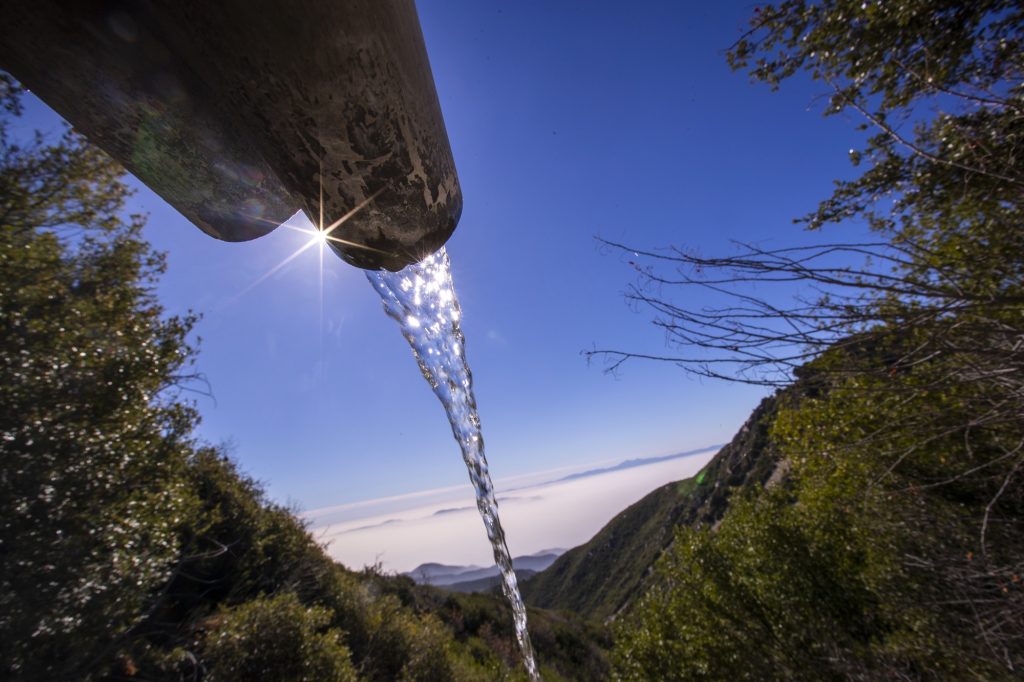A California judge has ruled in favor of BlueTriton Brands, allowing the company to continue using water pipelines in the San Bernardino National Forest—at least for now. The decision comes amid an ongoing legal dispute between BlueTriton and the U.S. Forest Service over the company’s permit renewal.
BlueTriton Granted Preliminary Injunction
On January 13, 2025, U.S. District Judge Jesus G. Bernal granted BlueTriton Brands’ motion for a preliminary injunction—a temporary court order that allows the company to keep using its water pipelines while the case unfolds.
BlueTriton, known for Arrowhead Mountain Spring Water and Ozarka Natural Spring Water, has been involved in a legal fight with the U.S. Forest Service over its ability to divert water for bottling.
This ruling means that BlueTriton can continue extracting and transporting water from the Strawberry Canyon Springs while the court deliberates on the broader legal issues surrounding its water rights.
Decades-Old Water Diversion in Question
According to court documents, BlueTriton and its predecessor, Nestlé, have been diverting water from Strawberry Canyon since the 1880s—long before the San Bernardino National Forest was established in 1893.
Currently, the company uses twelve tunnels and boreholes to collect water from the springs. The water then travels through a 23,000-foot-long, 4-inch steel pipeline that was constructed in the 1930s. This system transports water to a collection site, where it is then bottled and also used at the Arrowhead Springs Hotel, which is owned by the San Manuel Nation.
As part of an agreement with its predecessor, BlueTriton is required to send at least 20% of the collected water to the hotel property, which is outside the national forest.
Legal Challenges: Does BlueTriton Have the Right to Divert Water?
The controversy over BlueTriton’s water rights began in 2015, when the California State Water Resources Control Board (Water Board) received numerous complaints and an online petition against Nestlé.
Complaints alleged that:
BlueTriton was diverting water without proper water rights.
The company was using an unreasonable amount of water.
Public trust resources were being harmed.
The company was failing to accurately report its water diversions.
1914 Water Commission Act Complicates Matters
One of the central legal issues in this case is whether BlueTriton’s water diversions began before or after 1914.
In 1914, California passed the Water Commission Act, which requires companies to obtain a permit to divert water for bottling and other commercial uses.
In July 2023, a Water Board official determined that BlueTriton began taking water after 1914, meaning it should have obtained a state permit. However, BlueTriton has not had the required permit to divert water from Arrowhead Springs.
Forest Service Denies BlueTriton’s Permit Request
Following the Water Board’s decision, the U.S. Forest Service began reviewing BlueTriton’s permit application. Officials requested specific details about how and where the water was being used—especially since recent records showed that the water was mainly being delivered to the San Manuel Nation for use at the Arrowhead Hotel, rather than being bottled.
BlueTriton failed to update its application with clear details on the hotel’s water usage, instead providing only general information. As a result, in July 2024, the Forest Service denied BlueTriton’s permit renewal request.
Judge Sides with BlueTriton, Cites Public Interest Concerns
For BlueTriton to secure a preliminary injunction, the company needed to prove that it would face significant harm if access to its water pipelines was blocked.
Judge Bernal agreed with BlueTriton’s argument, stating that:
The company would suffer financial harm from losing access to its water source.
Disrupting the water flow could negatively impact the local economy.
Additionally, BlueTriton warned that cutting off water access could hinder fire suppression efforts in the region. Given California’s history of devastating wildfires, this argument carried significant weight.
While the Forest Service pointed to potential environmental damage, the judge ultimately ruled that keeping the pipelines operational was the most reasonable decision until the legal dispute is resolved.
What Happens Next?
Temporary Victory for BlueTriton
For now, BlueTriton can continue using the pipelines to divert water. However, this is only a temporary solution—the broader case regarding BlueTriton’s water rights and permit requirements is still ongoing.
Environmental and Public Interest Concerns Remain
Environmental activists argue that continued water diversion could harm local ecosystems and natural water sources.
The Forest Service maintains that BlueTriton is not complying with federal requirements.
Potential for Future Legal Battles
If the court ultimately rules against BlueTriton, the company may have to cease water diversion operations entirely or secure a proper state permit.
The ruling could set a precedent for other companies that rely on natural water sources in California.
Final Thoughts
This legal battle between BlueTriton Brands and the U.S. Forest Service highlights the complexities of water rights, environmental conservation, and corporate interests in California.
With fire safety, economic concerns, and environmental impacts all at play, the outcome of this case could have long-lasting implications for water management policies across the state.
For now, BlueTriton has won a temporary victory, but the fight over who has the right to divert and profit from California’s natural water resources is far from over.
Disclaimer – Our editorial team has thoroughly fact-checked this article to ensure its accuracy and eliminate any potential misinformation. We are dedicated to upholding the highest standards of integrity in our content.





More Stories
Judge Rules BlueTriton Can Continue Using SoCal Pipelines Amid Legal Battle
Judge Rules BlueTriton Can Continue Using SoCal Pipelines Amid Legal Battle
Judge Rules BlueTriton Can Continue Using SoCal Pipelines Amid Legal Battle